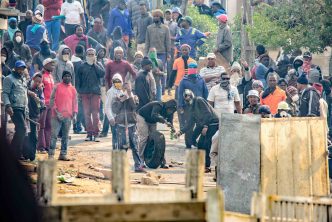Addressing the Problem
By Ndubuisi Nwokolo and Iro Aghedo
Background
Islamic jihadists have deployed ambushes to scale up their operations in northern Nigeria and the broader Lake Chad Basin region in recent times. This strategic assault has been effectively used by the guerrillas to spring surprises on Nigerian troops, damaging the latter’s supposed asymmetric power advantage. The Islamic State West Africa Province (ISWAP), which broke away from the Boko Haram radical sect in 2016, has focused explicitly on raiding military bases and laying ambushes on troops’ convoys. In March 2020, the insurgent group attacked a military convoy with rocket-propelled grenades near Gorgi village in Borno State, killing 70 soldiers on board; injuring scores; and taking some others as captives. Another twenty-three soldiers were killed at Bulabulin village along the Maiduguri-Damboa road in July 2020 when the ISWAP ambushed a military convoy. Similarly, 15 security personnel including three soldiers and eight police officers perished when ISWAP fighters ambushed the convoy of the Borno State Governor Babagana Zulum in Baga town near the Lake Chad on September 24, 2020.
For over a decade, Nigerian security personnel and their allies have been grappling with repelling jihadist extremism in the North-East without success. Collectively, over 36,000 lives have been lost and about two million persons displaced as a result of the violence. Ironically, Nigerian troops and police have won UN medals and laurels for their peacekeeping interventions in some global hotspots. For example, Nigerian troops were involved in the UN Mission in Liberia. The country has also served meritoriously in non-UN peacekeeping roles in other African states such as the AU Missions in Sudan, Cote d’Ivoire, Mali and Sierra Leone (McGregor, 1999). However, despite having helped to restore peace to some global hotspots, Nigerian troops have not been able to quell jihadist forces, hence the castigation that their “charity begins abroad” rather than home (Eke, 2015). This essay examines the constraints which make Nigerian troops vulnerable to jihadist ambushes. It also makes recommendations on how to address the challenges.
Multiple Constraints
Nigeria’s military has declined terribly since the country returned to civilian rule in 1999. A combination of corruption, poor leadership, and inadequate personnel training have hollowed out the military (Banini, 2020). Nigeria’s $1.6 billion defence budget is one of the highest in Africa, yet the country’s counterinsurgent troops are so underfunded and ill-equipped that many soldiers resort to desertion and mutiny. On account of the untold hardships faced in conducting combat operations, 356 soldiers voluntarily disengaged from the Nigeria Army in July 2020, forcing the House of Representatives to probe the mass resignations. Even though Nigeria has several police and military agencies saddled with intelligence gathering, they are mostly unable to perform their duties effectively. Organisations such as the Criminal Investigation Department, Force Intelligence Bureau, National Intelligence Agency, and Defence Intelligence Agency find it hard to conduct efficient evidence-gathering procedures, and they lack a credible criminal database (Ashaolu, 2012).
Also, Nigerian security organisations lack adequate modern equipment such as facial recognition software, thermal imaging, enhanced body-worn cameras, and other technological gadgets. These types of equipment are critical to modern security operations as done in Europe, the US and other Western countries. Even basic safety kits such as helmets, safety boots and bullet-proof vests are hardly available for security personnel in the country. Often, security agents hire private vehicles because most of theirs have become rickety. Even their weapons are like toys when compared to the sophisticated ones at the disposal of criminals, insurgents and rebels. Besides, the ranks of the security personnel have depleted in recent years because of a lull in recruitment, rising combat-related deaths, and retirement exercises. These have led to the proliferation of vigilante groups and ethnic militias to fill the void (Onuoha and Kwaja, 2018).
Policy Recommendations
These lapses have made the security agents endangered species as evidenced by their constant ambushes and killing by insurgents. Thus, addressing the constraints is critical to the restoration of public safety for the security agents and the citizens alike.
1. It is necessary to train security agents in managing guerrilla combat: Insurgency is still relatively new in Nigeria. As a result, the country’s security personnel, such as the police and military, have not sufficiently come to grips with the guerrilla tactics, hence their growing victimisation. So, further training is imperative on how to manage guerrilla warfare. They can borrow a leaf from the experiences of Israel and Northern Ireland in the UK which have relied significantly on security training to scale down insurgent ambushes and attacks over the years (Killworth, 1998; High-Level Home Front Group, 2016).
2. Modern technological gadgets need to be provided: This is to combat the growing sophistication in security threats and insurgency in Nigeria. There is a need for the use of non-conventional counter-measures. Thus, modern innovative gadgets, such as long-range cameras, need to be provided for the security agents for surveillance and detection of threats. For example, the British Police now use long-distance cameras to catch erring drivers 1km away. Such cameras could be used to detect insurgents laying ambush afar off.
3. Security personnel should receive payments of their salaries and emoluments promptly. All financial entitlement of counterinsurgency officers should be paid on time to boost their morale. This action will checkmate desertion and mutiny by officers. To ensure this, the funds of those at the front lines can be held in a particular bank account for prompt release to the security personnel.
Conclusion
There has been a surge in cases of ambush and deadly attacks on security agents by jihadist insurgents in recent times. To safeguard them and the members of the public they are meant to protect, modern weapons and operational gadgets should be provided for them, and their financial entitlements paid to them as and when due.







